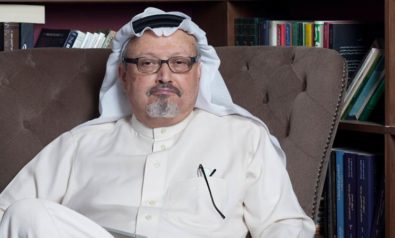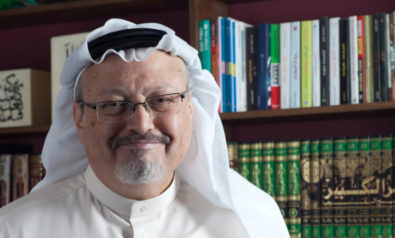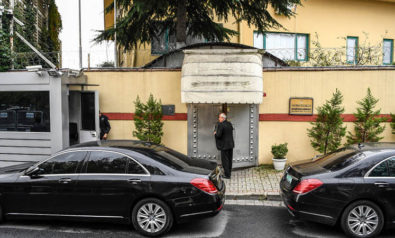Jamal Khashoggi, albeit neither a dissident nor an activist, was a free voice — enough to make him a persona non grata for the Saudi regime.
It is impossible to deny that we — “Saudi” dissidents and activists — were shocked when the news of the disappearance of the prominent journalist, Jamal Khashoggi, who was critical of Crown Prince Mohammed bin Salman’s regime, first broke. The shock became stronger when rumors and reports spread about the possibility of Khashoggi having been killed inside Saudi Arabia’s consulate in Istanbul on October 2. We are concerned and worried about his fate and closely follow new revelations about his fate.
We await the results of the investigations currently being conducted by the competent authorities in Turkey. Meanwhile, we can analyze the situation and the circumstances of Khashoggi’s disappearance and try to build a most plausible scenario of what could have possibly happened that day. I will provide my analysis based on the publicly available information and put it in context and in line with the past history of the Saudi government’s practices.
First, I believe the culprit behind Khashoggi’s disappearance is the government of Saudi Arabia; that is what most of the Saudi dissidents and activists believe. Khashoggi, albeit neither a dissident nor an activist, was a free voice — enough to make him a persona non grata for the Saudi regime. This is especially true given Khashoggi’s fame and widespread global audience provided by his Washington Post platform. This is very important because, believe it or not, the Saudi regime cares deeply about its image and spends a lot of money on public relations campaigns to polish it.
Someone like Khashoggi might tarnish all of this effort in just one column, which he did, repeatedly. Moreover, at some phase in his career, Khashoggi happened to be part of the government and close to both the diplomatic and intelligence apparatuses when he was a media advisor to Prince Turki al-Faisal — who headed the Saudi General Intelligence Directorate between 1977 and 2001 — when al-Faisal was ambassador to the United Kingdom and then the United States. That makes him a moving receptacle of state secrets whom the Saudi regime will by no means tolerate walking about the world freely.
While Khashoggi may not defect and expose the secrets in his possession, they might unintentionally slip through when he speaks or writes, which is a nightmare for the Saudis. All in all, Khashoggi is a wanted unwanted voice for the regime. Riyadh will go to any lengths and measures to stop and incarcerate him, hence our belief that the Saudi government is the culprit in Khashoggi’s disappearance.
How Did They Do It?
Now that we have established the culprit, there remains the question of what could have possibly happened. How did they do it? The most plausible scenario, based on the public information available and on the Saudi regime’s modus operandi, is that Khashoggi has been abducted and forcibly moved to Saudi Arabia. It is possible that on his first visit to the consulate, he was made to feel safe so that he would come back thinking he would leave without any harm. They were prepared and expecting him on his second visit.
When he first went to the consulate on September 28, they possibly delayed his papers and then asked him to come back at a later date. Most likely the consul informed the Saudi intelligence that Khashoggi was at the consulate — if the Saudi intelligence was not tracking him already. Since no one was expecting him on the first visit, it did not give them enough time to prepare the kidnapping, so the consul was instructed to make him come back, buying the perpetrators time to prepare.
How would they kidnap him? In 2004, the Saudi authorities kidnapped a dissident from the royal family in Switzerland. Prince Sultan bin Turki — nephew of King Fahad — was invited him for a tea with Abdulaziz bin Fahad, who was then secretary general of the royal court and the king’s son. In that meeting, they had a discussion and asked him to return with them. When Turki refused, they injected him in the neck with some sort of an anesthetic — done by a doctor, most likely — and transported him from Geneva to Saudi Arabia.
I think this scenario is what most likely happened to Khashoggi. He could have either been injected with an anesthetic right away, when he was not paying attention, or someone could have slipped him a sedative in a drink and then introduced the long-term anesthetic into his body. Most likely all of this was done under the supervision of a doctor, because they don’t want to harm or kill Khashoggi. And this is important. Here is how the Saudi regime thinks: They don’t consider kidnapping a dissident being wrong — they see it is as a righteous act. And when they anesthetize him, they genuinely try not to kill him in the process. When you are going into surgery, you are doing it because it is good for the patient, and the anesthesia is part of it, so it is absolutely fine to do it, according to their moral code.
For the Saudi regime it is absolutely acceptable to kidnap Khashoggi, because they have done it on “their soil” (the consulate), because for them he is a criminal (any free outspoken Saudi is a criminal for the regime) and a wanted man, so they had the right to kidnap him. So between them, the Saudi authorities don’t feel guilty because what they are doing is right and acceptable. Yes, it is not legal and contravenes international norms and law, but who cares as long as they manage to hide the truth forever.
Don’t Let Us Perish
I highly doubt the reports that Kashoggi has been murdered. It is possible that he died during the anesthesia, and that is the only way that he could have died inside the consulate. If the Saudis wanted to assassinate him, why do it in the consulate? Plus, the Saudi regime is mostly known for abductions and not assassinations.
Why were there rumors that Khashoggi was murdered inside the consulate based on leaks from the Turkish authorities? Maybe because there is no evidence of him exiting the building and as such it would be a fair assumption to think he was murdered. The Turkish authorities might also have more information that they have not released yet and have based those assumptions on.
So, after the anesthesia, they must have put him in a diplomatic package and put him inside a car belonging to the consulate that was reportedly seen leaving the premises. In that car, there must have been a medical team to monitor his condition, and the package must have been open during the transit to the plane. A diplomatic package is inviolable as per the Vienna Convention on diplomatic relations and cannot be inspected. This package could have been transported out of the country on a private plane. A team of 15 Saudis that arrived in Turkey that day and went to the consulate came on private jets. So, they could have taken Khashoggi back with them.
Once on the plane, the package would have been opened, and the medical team would have continued to take care of the prisoner. They could have either woken him up on the plane or kept him anesthetized until they landed in Saudi Arabia. Both are plausible scenarios. Once on Saudi soil, they could detain him. The black op is complete.
Now that the accusations have been elevated from kidnapping and abduction to assassination and murder, that does not give the Saudis room to admit that they have him. In other words, the Saudi regime will never reveal the whereabouts and the fate of Khashoggi until he dies in its custody.
I don’t believe that Khashoggi is literally dead. He is dead in another, and worse, sense. He is now a man without freedom or a voice to be heard. He is now in custody in Saudi Arabia and possibly subjected to torture. I am afraid he will remain a prisoner for the rest of his life, because the Saudi regime cannot afford to reveal the truth about the kidnapping.
All of this shows the extent to which the Saudi authorities are willing to go in order to silence any free mind and every free voice. This is alarming, and if the international community does not take measures to pressure Riyadh to reveal Khashoggi’s whereabouts and fate, we will be heading down a dangerous path where the regime will feel empowered to do it again to any of the dissidents and activists abroad. There are not many of us, and we ask the world to not let our species perish.
The views expressed in this article are the author’s own and do not necessarily reflect Fair Observer’s editorial policy.
Support Fair Observer
We rely on your support for our independence, diversity and quality.
For more than 10 years, Fair Observer has been free, fair and independent. No billionaire owns us, no advertisers control us. We are a reader-supported nonprofit. Unlike many other publications, we keep our content free for readers regardless of where they live or whether they can afford to pay. We have no paywalls and no ads.
In the post-truth era of fake news, echo chambers and filter bubbles, we publish a plurality of perspectives from around the world. Anyone can publish with us, but everyone goes through a rigorous editorial process. So, you get fact-checked, well-reasoned content instead of noise.
We publish 2,500+ voices from 90+ countries. We also conduct education and training programs
on subjects ranging from digital media and journalism to writing and critical thinking. This
doesn’t come cheap. Servers, editors, trainers and web developers cost
money.
Please consider supporting us on a regular basis as a recurring donor or a
sustaining member.
Will you support FO’s journalism?
We rely on your support for our independence, diversity and quality.

















